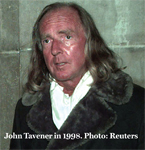Minimal, dramatic, melodic, some pieces appearing fully formed in the time it takes to perform them. The Tablet’s music critic offers an appreciation of the work of John Tavener, Britain’s most popular classical composer, who died this week
Composer John Tavener defied the laws of progress and reason in his insistence from an early age that music was intrinsically related to spirituality and could not be divorced from religion, which was always its first master.
Born in 1944, Tavener was junior by a decade to the ennobled modernists Sir Harrison Birtwistle and Sir Peter Maxwell Davies, whose abrasively secular idiom seemed to have persuaded the listening public that music, which had once been seconded into church service, had now reverted to its ancient role as a dry accompaniment to social rituals. God was dead or, if not, he was waiting in line democratically with the rest, a church commission to be fitted, perhaps, between others.
The upstart Tavener saw music differently. The idea that harmony was not related to proportion in the universe was absurd, that it could be distorted into unresolving dissonances and sold as a finished product, contrary to nature. He told me once in an interview that he had no feeling for music after Thomas Tallis or his sixteenth-century namesake John Taverner, masters both of sacred Latin polyphony. Even Bach was too humanist, too concerned with expressing the personal rather than the universal. Tavener seemed to think that music, having come from the universe, had a duty to express universal ideas.
Inspiration was a wonderful phenomenon to him. Melodic ideas, he said, appeared fully formed in his mind. He revered these sonic apparitions and felt bound to carry them untarnished into the world. He put the simple melody of the Song for Athene in front of the worldwide audience for the funeral of Diana, Princess of Wales, capturing the emotion of the day.
People were knocked out by the audacity of Song for Athene. Nothing clever, nothing complex, just a stepwise tune repeated, rendered minor, fitted to the syllables of the word “alleluia” and underpinned by an unwavering drone. Like many of his works, it was not written to commission, but in response to the death of a friend’s teenage daughter in 1993. The Sony recording made by the Westminster Abbey Choir was conducted by Martin Neary, who championed the still relatively unknown composer.
Fame did not come as a surprise to him and he was proud of his unique voice. He did not think his contemporaries spoke as clearly. “Could the ordinary citizen distinguish between Birtwistle and Maxwell Davies?” was his rhetorical question. A Tavener piece was unmistakable, as was he who had grown up attracting attention by his extraordinary physique.
It was a 6ft 6in, long-blond-haired music student who charmed the youth club at St Andrew’s Presbyterian Church, West Hampstead, and bought his clothes in Chelsea in the early 1960s. The Beatles knew him and produced The Whale, his choir-and-orchestra setting of the Vulgate account of Jonah, on the newly formed Apple label. Ringo Starr played percussion. Its 1968 premiere was also the inaugural concert of the contemporary specialist orchestra, the London Sinfonietta.
Tavener’s religiosity took him away from instruments. He sought the sources of Christianity and discovered that the Eastern Church, in which even the organ was profane, came closer than his own. Some communities even still spoke Aramaic, the language of Christ. If Tavener brought audiences to Christianity in general, he more specifically opened up the Greek and Russian Orthodox communities, which had previously remained rather hidden in British society, the patriarchate appearing in beards and alien headgear only at infrequent state or municipal religious functions.
Tavener’s music pared itself down to the bare melodies that made him famous. Musicologists traced a parallel development in the minimalist movement, and decided he was one of them, labelling his music “Holy Simplicity”. It was given credence as a genre with the emergence of Arvo Pärt and Henryk Górecki who, whether influenced by him or not, composed with the same reverence for melody and text.
The success and popularity of Tavener’s music helped to offset what some felt was the drudgery of performing it. The bass charged with singing a drone all night might complain that he had not trained just to sing single notes. The repetitive phrases, characteristic of minimalism, risked boring the singers. The great length of some works could be endured only by accepting them as aids to meditation.
Expectations that the music might develop, as a sonata form allegro movement does, were confounded. There were flashes of humour. The anthem God is With Us runs for pages repeating the same lulling lines when, just as it seems everyone has fallen into a stupor, the previously silent organ wakes up and crashes out a radiant discord on the word “light”. The soloist must develop a break in his voice rather like a muezzin wailing from a minaret.
One hears common origins with Islam in Tavener. In Fall and Resurrection, he calls for a type of clerical tenor called a psaltis, casually adding that if one were not available “a member of the choir should study Byzantine chant”. Tavener honoured Islam in his 2004 work, The Beautiful Names, which was premiered in Westminster Cathedral in 2007 and whose text is nothing more than a list of the 99 forms of address for Allah from Al-Muhyi, “the giver of life”, to Al-Mumit, the taker of life.
For all the clarity of his expression and singularity of voice, Tavener remained a searcher for truth. He read widely and was inspired by poets. Yesterday he was to have been present at the premiere of his Three Shakespeare Sonnets in Southwark Cathedral. An earlier love was the symbolic mysticism of William Blake, from which his miniature masterpiece, The Lamb resulted. There was no question of boredom or monotony here. The parts diverge and converge, moving in parallel, each with its own mostly stepwise melody, the text touching, its profound simplicity matched by the perfect circle of Tavener’s score, ending where it began.
Like Athene, The Lamb was composed not for a commission but for a nephew’s third birthday, the music “coming to him in no more time than it takes to perform” as the Sony programme note put it. He was a revered figure on the international music scene and he will be missed.





 Loading ...
Loading ...
What do you think?
You can post as a subscriber user...
User Comments (0)